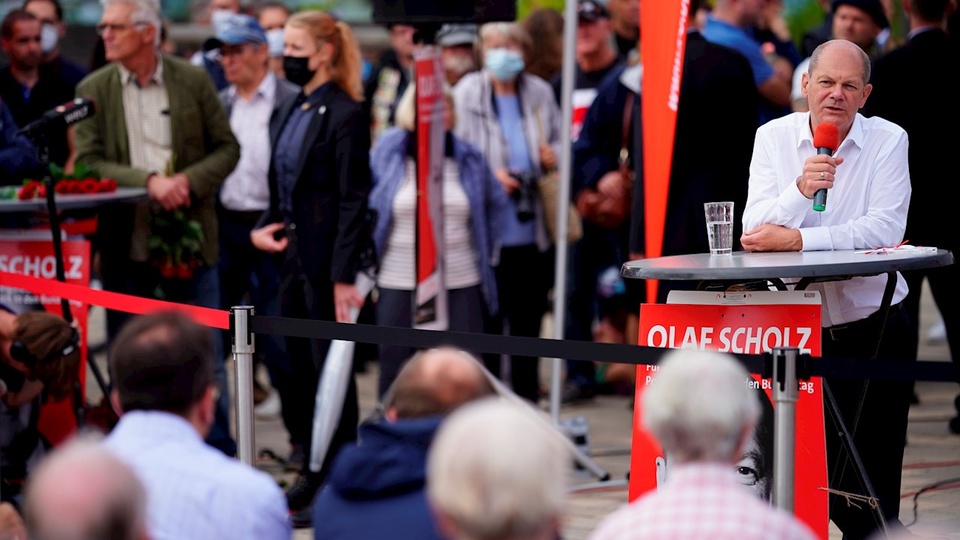
[ad_1]
More than 60 million Germans have the right to elect the new Parliament this Sunday, from which it will emerge Angela Merkel’s successor as chancellor. Thus, the main economy of Europe will end 16 years of government of the leader of the Christian Democrats, in elections with an uncertain end.
Merkel’s CDU rivals Armin Laschet, President of the Land of North Rhine-Westphalia; the social democrats (SPD) go with the Minister of Finance and Vice-Chancellor Olaf Scholz; and Greens lead Annalena Baerbock. Scholz appears first in the polls, with 25 percent of voting intentions, followed by Laschet, with 22 percent. Environmentalists reach 17 percent, and the undecided are around 25 percent.
The SPD has taken the lead thanks to the positive image of Scholz, the second highest-rated politician in the country after Merkel, according to a poll published by the public broadcaster ZDF. Scholz presented himself as the most Merkelian of all the candidates, in an attempt to maintain some continuity.
If the forecast comes true, only a coalition of at least three parties has any chance of achieving an absolute majority in parliament and forming a government. This is why the number of votes of the Greens is important, as well as the The liberals of the FPD, who reach 11% in the polls.
Possible alliances
Scholz could be the first social democratic chancellor since 2005 if your party is associated with the Greens and the Liberals (the so-called “traffic lights” coalition in the colors of each party). He could also rule with environmentalists and the La Izquierda party. An alliance with the liberals and the CDU in minority would not be excluded either. In reality, the SPD is the minority partner of the last Merkel government.
Laschet could lead the government if he reaches a deal with the Liberals and Greens, in a possible coalition known as Jamaica, also by party colors. What is completely dismissed is to add to the future coalition an alternative for Germany, the extreme right-wing force which brings together 11% of preferences. All the other parties rejected this scenario.
So, after the election, it could take up to six months to form a government, a period during which the executive will continue to be in charge of Merkel, while they lead the talks.
The climate issue
Both the climate issue and the health crisis are the main concerns of the population (respectively 47 and 28% according to a survey) and were at the center of the campaign.
With more than 180 dead and around 7 billion euros in damage, the floods of last July showed that climate change is affecting the country and that Germany needs drastic measures in order to achieve its ambitious goal of reducing carbon emissions to zero by 2045.
By the end of 2021 Germany will abandon nuclear power, but the transition towards renewable sources is not fast. The country is the largest emitter of greenhouse gases in the European Union (EU) and more than three quarters of the energy it consumes comes from fossil fuels.
The impact of the pandemic
The coronavirus pandemic is also one of the biggest challenges for the next president, which should speed up the vaccination campaign and convince the undecided. Germany already has the 63 percent of its inhabitants fully vaccinated, but the inoculation rate barely increased last month and authorities have warned that to stop a fourth wave more than 85 percent of the vaccinated population is needed.
Otherwise, new restrictions will have to be imposed that threaten to hit the economy and the level of public debt, which now stands at 75% of GDP. A big challenge will be to reduce this figure without reducing urgent investments.
It will be voted on under health protocol in Sunday’s elections and it is expected that the postal vote. In the 2017 election, 28.6 percent of voters chose this option and, on this occasion, state-owned postal company Deutsche Post predicts a record number, which could be between 40 and 50 percent of the total vote. issued.
.
[ad_2]
Source link
 Naaju Breaking News, Live Updates, Latest Headlines, Viral News, Top Stories, Trending Topics, Videos
Naaju Breaking News, Live Updates, Latest Headlines, Viral News, Top Stories, Trending Topics, Videos